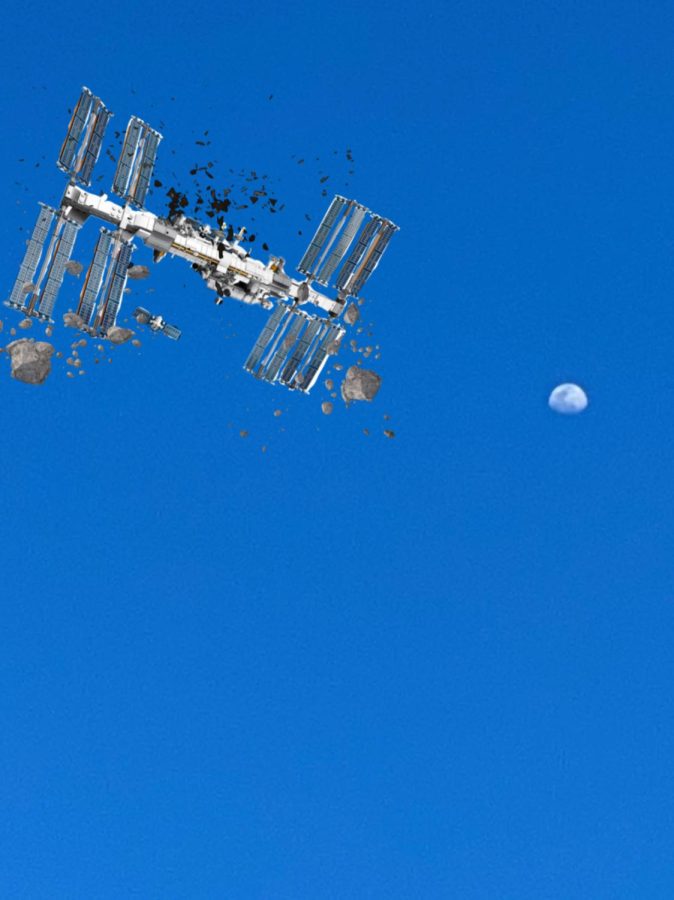Who will Help the ISS?
Najalae Griffith edited on “PicsArt”
Recently, the head of the Russian space program said that Russia could possibly let the International Space Station (ISS) fall back to earth at an uncontrolled de-orbit before the ISS’s set death date. Only time can tell what the future of the ISS looks like. If the ISS drops down to Earth on a NATO country before SpaceX Dragon Capsules or the ISS death date it could possibly spark WW3.
March 25, 2022
On March 4, 2022, Russia’s space agency announced that Russia will not cooperate and will no longer work on the International Space Station’s (ISS) science experiments with Germany. Originally, NASA set the ISS to fall back to Earth by 2031. Russia’s space agency leader, Dmitry Rogozin, announced that Russia will create its own smaller space station for research and use it for data purposes for Russian engineers only. Russia also stopped selling rockets to the U.S., which NASA heavily depends on.
Slowly becoming a spacecraft graveyard, Point Nemo remains the only place on earth farthest away from land. Scientists consider it the safest place to crash a spacecraft. Currently, Point Nemo hosts 250-300 old space crafts at the bottom of the ocean. Russia’s involvement with the ISS regards its gravitational pull. The ISS relies on Russia to keep the spacecraft thrusting and keeping it in orbit with Earth, as well as navigating it through space debris. Head of the Russian Space program, Dmitry Rogozin tweeted that if Russia’s involvement with the ISS ends it could potentially fall back to Earth uncontrollably and may not land in Point Nemo.
“It’s interesting because the ISS is already on its last leg and was scheduled to be brought down around 2031. It is believed that it will require another ship to move it out of orbit and the Russian rockets would help slow it down. Russia is basically saying it doesn’t hover over Russia so it’s going to fall where it falls and they don’t care in response to sanctions imposed on them,” astronomy teacher Chad Talley said.
As the crisis in Ukraine continues to grow, the war happening could potentially ignite increased global conflicts. On Thursday, February 24th, Russian forces invaded a neighboring county of theirs, Ukraine. The reason for these invasions involves the matter that Ukraine may potentially join NATO. The North Atlantic Treaty Organization (otherwise known as NATO), consists of an alliance between 30 member countries including the United States, Canada, Germany, European countries and the United Kingdom. All 30 countries founded NATO in 1949 and since then, whenever a member country comes in contact with a conflict or needs special aid, NATO member countries help supply them with food, water, army troops, etc.
Russia dislikes the idea that one of its “allies” may join an organization that may become strong enough to destroy Russia as a whole. With modern technology, scientists take part in locating where the ISS may plunge if Russia chooses to withdraw their cooperation with the spacecraft. Habitable areas of the ISS dropping include the US, Europe, India, and China. Europe and the United States mainly run NATO. If the ISS dropped on either of the vital countries, it could possibly trigger the start of WW3.
“I think the space world is going to fall in line with the country’s responses to sanctions. Most of the world will stop buying from Russia and I don’t believe currently there is enough value in just a few Russian rocket companies that are helpful to space missions to worry about. I don’t think many timelines will change as NASA has been historically slow with projects like the James Webb telescope that was about 8 years late,” Talley said.
By 2025, Russian technology and research will officially become withdrawn from the ISS. Thankfully, hope arises for the ISS. Founder of SpaceX Elon Musk, tweeted if Russia withdraws its responsibilities from the ISS, SpaceX Dragon Capsules can serve the same purpose. SpaceX designed the Dragon Capsules to indicate and thrust heavy objects and can help keep the ISS inside Earth’s orbit.
“SpaceX’s specialty is rockets so I’d think it would be a possibility. They will not save it because it’s already terribly outdated but could slow its descent and guide it to where it was originally scheduled to fall. But to be clear, the ISS has served its purpose, it will not be updated. It’s also a possibility to let it hang up there until a better solution can be found,” Talley said.







